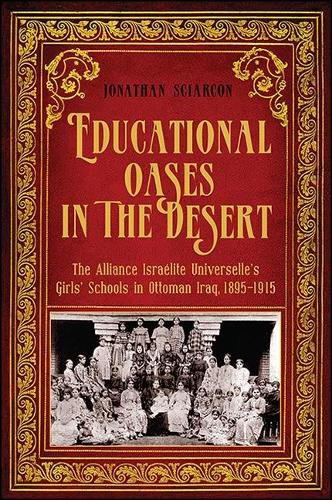Readings Newsletter
Become a Readings Member to make your shopping experience even easier.
Sign in or sign up for free!
You’re not far away from qualifying for FREE standard shipping within Australia
You’ve qualified for FREE standard shipping within Australia
The cart is loading…






During the late nineteenth and early twentieth centuries, the Alliance Israelite Universelle (AIU), a Paris-based Jewish organization, founded dozens of primary schools throughout the Middle East. Many were the first formal educational institutions for local Jewish children. In addition to providing secular education, the schools attempted to change local customs and regenerate or uplift communities. Educational Oases in the Desert explores the largely forgotten history of the AIU’s schools for girls in Ottoman Iraq. Drawing on extensive archival research, Jonathan Sciarcon argues that teachers viewed female education through a gendered lens linked to their understanding of an ideal modern society. As the primary educators of children, women were seen as society’s key agents of socialization. The AIU thus concluded that its boys’ schools would never succeed in creating polished, westernized men so long as women remained uneducated, leading to the creation of schools for girls. Sciarcon shows how headmistresses acted not just as educators but also as models of modernity, trying to impart new moral and aesthetic norms onto students.
$9.00 standard shipping within Australia
FREE standard shipping within Australia for orders over $100.00
Express & International shipping calculated at checkout
During the late nineteenth and early twentieth centuries, the Alliance Israelite Universelle (AIU), a Paris-based Jewish organization, founded dozens of primary schools throughout the Middle East. Many were the first formal educational institutions for local Jewish children. In addition to providing secular education, the schools attempted to change local customs and regenerate or uplift communities. Educational Oases in the Desert explores the largely forgotten history of the AIU’s schools for girls in Ottoman Iraq. Drawing on extensive archival research, Jonathan Sciarcon argues that teachers viewed female education through a gendered lens linked to their understanding of an ideal modern society. As the primary educators of children, women were seen as society’s key agents of socialization. The AIU thus concluded that its boys’ schools would never succeed in creating polished, westernized men so long as women remained uneducated, leading to the creation of schools for girls. Sciarcon shows how headmistresses acted not just as educators but also as models of modernity, trying to impart new moral and aesthetic norms onto students.